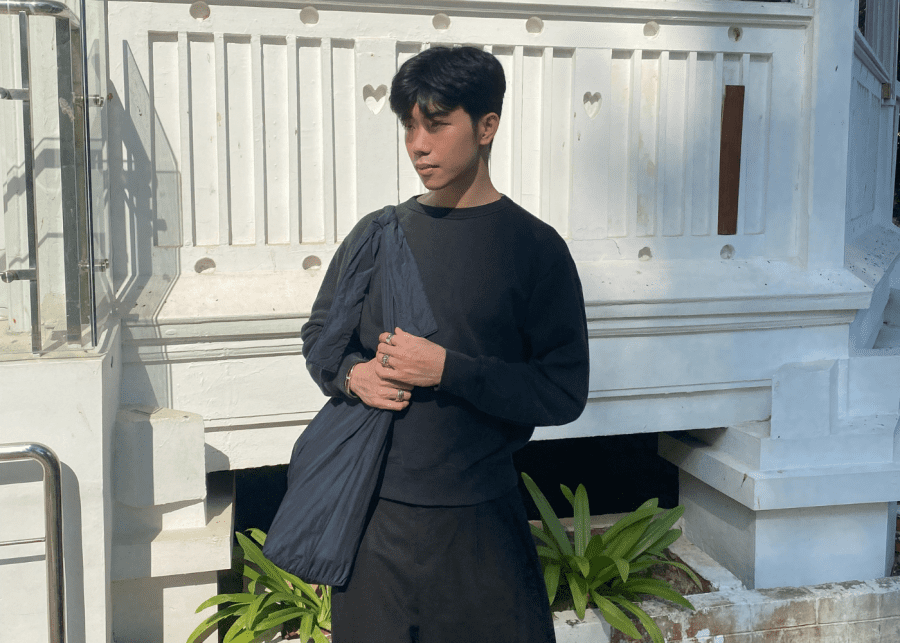
Ever wonder what life would be like if you lost one of your senses? Jet tells us his story and how he navigates his new life.
It’s said that your 20s represent the best years of your life. You’re moving into adulthood and discovering new things about yourself. And possibly finding (or losing) love along the way. It’s a time when you can party all night long and never worry about hangovers as you let the invincibility of youth take you through the day. Most of us are fortunate to be able-bodied, without handicaps to disrupt our days. But for others, that indestructibility is short-lived. The best years of their lives are tangled up with new disabilities. Being blind, wheelchair-bound, and deaf in Singapore are just a few examples.
You might think, what are the chances you’ll end up disabled in your lifetime? Because we’ve thought about this too. The reality is that health complications and accidents can happen to anyone, no matter their age. Jet Shan Ng is one of them, so we sat down with the 25-year-old to find out what life is like as someone with a disability diagnosed in his 20s.
When everyone sees (and hears) something you don’t

If you ask Jet about when he realised he was going deaf, he’ll admit he wasn’t the first to notice. Instead, it was the people around him. It started off with small occurrences at home, like not responding when his name was called. Asking off-topic questions in a social conversation. Or struggling to hear what a teacher said in class. That clued in the people around him about the possibilities of his disability.
Next came what Jet’s family believed to be a minor ear infection when he was 12. A routine hearing test led to the realisation that he had mild to moderate hearing loss in both ears. But when the suggestion of hearing aids came up, a young Jet was vehemently against it. He believed that if he could still hear, there was no reason to get aids. Coupled with the teasing that came from his friends, he remained resistant in his younger years.
“As a child, the last thing you want to do is stand out. I just wanted to be normal,” he tells me.
A toxic relationship with music

The one constant in Jet’s life? Music. He’s a dedicated fan. However, despite the advice of doctors not to listen to music with earbuds or at loud volumes, he persisted. Seeking an identity for himself, he turned to the metal subculture scene in Singapore. Little did he know the harm that would come with it.
Because of the gradual deterioration, it was hard for Jet to tell how badly his hearing worsened. The concerts he frequented began to take their toll. He struggled to hear things his lecturers said during class. In big group gatherings, he was unable to keep up with conversations. Being the only one left out of the loop placed him in an awkward position.
“Social situations were incredibly daunting for me,” he says. He became self-conscious, as he needed people to constantly repeat sentences for his understanding. More often than not, he used his friends as a crutch to fill empty moments in conversation. This led to a spike in his social anxiety and fear of group gatherings. Not knowing anyone who struggled with hearing loss left Jet unable to express his grievances.
Oh, the audaciousness of youth

Jet admits that, due to the diagnosis at an early age, he began lashing out. “In my mind, I was still able-bodied,” he says. Instead of accepting the disability, he did things that exacerbated his condition.
As a music lover and self-proclaimed “metalhead”, he rebelled by attending concerts and gigs when he was 16, much to his parents’ dismay. Because of the loud volume, it was normal for him to temporarily lose his hearing after a show. “I knew I shouldn’t do it. But my hearing always came back, so I thought it was fine.”
Jet’s actions may seem counterintuitive, but having an Invincibility Complex is actually a common occurrence among teens. “Adolescence is a period of continued brain growth and change. Impulse control is one of the last areas of the brain to mature,” Syaza Hanafi from Psychology Blossom explains. The lack of impulse control means poorer decision-making and risky behaviour.
And yes, it’s unlikely for you to lose your hearing when you’re young. But there’s still a chance. Dr. Barrie Tan, an ear, nose, and throat surgery specialist, says that even if you’re able-bodied, there are ways your hearing can be negatively impacted. “It can be as simple as wax build-up that blocks your hearing. Many young patients also develop infections, or damage their ear drums when they do activities like scuba diving.”
The sobering reality of his circumstances

The turning point came when Jet was 21. After a particular show that left him standing too close to a speaker, his temporary deafness lasted too long for comfort. A week went by and he realised his hearing didn’t come back the way it used to, which put his daunting situation into perspective for him. Fear and acceptance became the cocktail of emotions that gave him the extra push to get his hearing aids.
“I thought this would be my reality if I didn’t do something about it,” he says. So, Jet regained his confidence and took responsibility for his health. “I realised that if I kept worrying about what other people think, it wouldn’t help me,” he explains.
“Once lost, our hearing may never recover,” Dr. Tan explains. As hair cells in the inner ear don’t have the ability to regenerate, you may not get back your hearing after losing it. “The goal is to preserve what’s left of my hearing,” Jet says, adding that he now sits between moderate to severe hearing loss.
His first step: hearing aids. Even though he’s thankful he can afford this solution, he misses aspects of his original hearing. “Your natural hearing is the purest form of hearing, nothing compares to it,” he says. Jet equates his hearing aids to low-quality headphones. He can now hear everything better than before, but it’s not the best. While he still goes to concerts, Jet wears earplugs and is conscious of the volume.
Deaf but thriving: A new and reborn Jet

Embracing his new identity was the last step in Jet’s journey of acceptance. It hasn’t always been easy. While his inner circle of friends and family have been supportive in helping him work through his disability, Jet still lacks a voice of experience he can turn to for advice. “I would’ve definitely started wearing my hearing aids a lot earlier if I had other deaf people in Singapore to talk to. Someone who could help me understand that it’s normal,” he says.
With his aids, he’s now more independent in group conversations. However, he still faces his fair share of offensive remarks about his disability. These range from casual laughter and disbelief, to not-so-playful jabs from acquaintances about whether they need to learn sign language to communicate with him.
“I’m only partially deaf, but people have a tendency of over-exaggerating my disability, which can get a little annoying,” he says. Due to a lack of understanding about what it’s like to be deaf in Singapore, seemingly harmless comments and jokes can come across as insensitive. But that hasn’t slowed him down. Jet continues to grow in confidence, wading through social situations that used to scare him.
A message to the reckless and the brave
If you’re dealing with a similar situation, Jet says that nothing’s more important than your health. “Get your hearing aids. Seriously. At the end of the day, your quality of life matters,” he says. It’s hard to ignore the potential stigma that comes with being disabled, especially if your situation is self-inflicted. Embracing it can be even tougher. But taking that first step to help yourself can bring clarity and relief. There’s also a myriad of solutions available. Besides hearing aids, there are auditory trainings and rehabilitation that help the brain relearn how to process noise into sound. You also have the option of surgical treatment and cochlear implants.
There’s nothing wrong with enjoying our youth. But let’s not take it for granted. Listen to your body when it tells you something is wrong, and have the courage to prioritise your health. If you have a friend who’s disabled, newly diagnosed or not, showing your support can mean a great deal to them. Ask respectful questions to educate yourself and approach others from a place of humble curiosity. Because creating an accessible and understanding space can make a world of difference.
If you require assistance with hearing care, consultations, or financial aid for assistive technology, please reach out to the Singapore Association for the Deaf.

